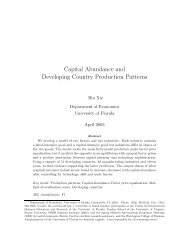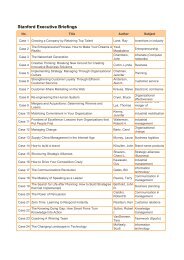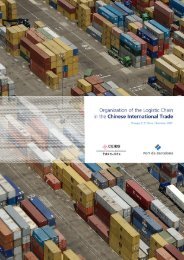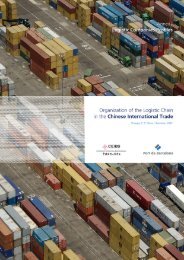游戏开始 - China Europe International Business School
游戏开始 - China Europe International Business School
游戏开始 - China Europe International Business School
Create successful ePaper yourself
Turn your PDF publications into a flip-book with our unique Google optimized e-Paper software.
2 封面关注 TheLINK 2007 冬季刊 TheLINK Winter 2007/8<br />
COvEr STOry<br />
Prof. Amy Shuen<br />
有了一个在中国开发畅销产品的好主意?在你将辛苦积<br />
攒起来的钱投进去,以及把自家住处变成工厂之前,《The<br />
Link》杂志作了一些调查,以便提高你的成功机率。我们就此<br />
采访了中欧的几位创业学教授,询问了对创业者来说最具潜力<br />
的行业、产品和服务。<br />
来自加州大学伯克利分校 Haas 商学院的中欧创业学访问<br />
教授 Amy Shuen 建议,中国未来的创业者要关注正在兴起的<br />
Web2.0 运动。“在 Web 2.0 的很多领域都有巨大的发展,特别<br />
对于中国年轻的城市职业人士来说”,她说。Shuen 教授正在<br />
完成她的新书的中文版,书中她预测了“下一波”因特网技术<br />
对世界和中国的影响。<br />
Shuen 的一个发现就是,中国公司和其他地方的公司一样,<br />
可以通过使用新兴的技术精确追踪和满足消费者需求来取得<br />
成功。Web 2.0 关注的是记录使用者行为的技术能力,企业可<br />
以据此制定更具针对性的广告计划。这在中国特别有用,因为<br />
这里的消费者的偏好变化很快。<br />
中国巨大的手机用户群——目前是世界上最大的——提供<br />
了巨大的赢利机会。Shuen 指出 Google 就是通过吸引用户和广<br />
告商使用其快速的关键词搜索来挣钱的。“谁要是能够使手机<br />
具备这个能力,那么他就可以成为中国的下一个 Google”,她<br />
说,“现在就是试图使用用户公开的或自愿提供的信息,为他<br />
们提供更加相关的服务。”手机现在已经被用来追踪用户的习<br />
惯,诸如呼出情况(如是否从同一个外卖公司购买午饭),甚至<br />
购物习惯(是否反复去附近的干洗店或者咖啡店),公司要是能<br />
收集和利用这些数据,然后直接满足消费者的偏好,就可以取<br />
得成功。<br />
Shuen 教授认为,“搜索引擎已经显示,创业者可以将很多<br />
当地的营销知识运用到网络上去。”下一步,在中国和全球,<br />
就是要发展平台,使这些数据“货币化”。<br />
中欧创业学教授葛定昆同意,不久的将来中国将“更加依<br />
赖科技驱动”,政府对高附加值的科技服务业的日益支持,以<br />
及国内专业技术的积累,将使该行业受益。<br />
葛教授不仅看到了新兴企业的前景,他认为中国整个服务<br />
行业都很有前途。他指出,美国的服务业产值达到 6000 亿美<br />
元,占 GDP 的 65%,而中国的服务业产值只占 GDP 的 38.7%<br />
(2007 年前三季度 )。随着中国经济的持续发展,服务业的发展<br />
潜力很大。<br />
选择什么行业创业?<br />
WHICH INDUSTRY?<br />
选择政府鼓励的行业是另一个选择。葛教授认为,“中国<br />
政府正在花重金来发展清洁技术——节约能源、降低污染物的<br />
项目,以及高科技行业,特别是生物技术和纳米技术。”<br />
两个趋势值得关注:中国的老龄化——65 岁以上的老人占<br />
上海人口总数的 24%,以及城市化。到 2015 年,超过一半的中<br />
国人将居住在城市里,为企业创造了满足一系列新需求的机会,<br />
比如餐厅业的增长,葛教授指出。<br />
最后,中欧言培文教授建议创业者采取正确的心态。他引<br />
用了欧洲富翁罗特席尔德的一番话:“小提琴的悦耳琴声在音乐<br />
厅响起的时候,是无法产生巨大财富的。只有当郊外响起嗖嗖<br />
的子弹声时,才可能创造巨大的财富。”言培文解释道,“变化<br />
是创业能力的来源。在中国,很多行业正经历着变化。只要发<br />
生巨大的变化,就可能产生巨大的创业机会。”<br />
Got a great idea for a hot product to launch in <strong>China</strong>? Before you<br />
cash in your hard-earned savings and transform your apartment into a<br />
factory, TheLINK has done some research to help improve your odds.<br />
We checked in with CEIBS professors specializing in entrepreneurship to<br />
ask which industries, products and services offer the best potential for<br />
entrepreneurs.<br />
Professor of Management Practice Amy Shuen, who now splits her<br />
teaching time between CEIBS and Berkeley, first advises <strong>China</strong>-based<br />
would-be entrepreneurs to pay attention to the booming Web 2.0 move-<br />
ment. “There is going to be huge growth in many of the ‘Web 2.0’ areas,<br />
especially among <strong>China</strong>’s young urban professionals,” she says. Shuen<br />
is now finalizing a <strong>China</strong> edition of her upcoming book on the Web 2.0<br />
phemonenon. The book predicts the impact of the “next wave” of internet<br />
technology worldwide, and in <strong>China</strong>.<br />
Among her findings, Shuen says companies based in <strong>China</strong>, as<br />
elsewhere, stand to win big by using emerging technology to accurately<br />
track and meet consumer demands. Web 2.0 technology focuses on the<br />
ability to record user behavior (web-viewing patterns and click-streams,<br />
for example), then customize advertising campaigns. This ability will likely<br />
prove extremely useful in <strong>China</strong>, a market in which consumer preferences<br />
change particularly quickly.<br />
<strong>China</strong>’s enormous mobile phone using population – now largest in<br />
the world – also offers vast, lucrative opportunities. Shuen points out that<br />
Google made its money by attracting users and advertisers to its efficient<br />
key-word searches via the laptop. “Whoever collapses this ability to the cel<br />
phone and makes it available for users will be the next Google for <strong>China</strong>,”<br />
she says. “The whole game right now is to try to use open and volunteered<br />
information from users to provide them with a more relevant experience.”<br />
Already, handsets are being used to track user habits such as calling pat-<br />
terns (ordering lunch from the same delivery service for example) or even<br />
shopping habits (repeated trips to the neighborhood drycleaner or coffee<br />
shop). Companies that can access and “mine” such data, then cater di-<br />
rectly to consumer preferences, will succeed.<br />
“Search engines have shown there is a great deal of local market-<br />
ing savvy that entrepreneurs will be moving onto the web,” says Shuen.<br />
The next step, in <strong>China</strong> and worldwide, will be to develop the platforms to<br />
“monetize” that data.<br />
Agreeing that <strong>China</strong> will be “more tech driven” in the near future,<br />
CEIBS Entrepreneurship Professor Ge Dingkun says this sector will benefit<br />
from the combination of increased government support for value-added<br />
tech services plus growing domestic expertise in the field.<br />
Taking a broader view of the landscape for startups, Prof. Ge says the<br />
entire services sector in <strong>China</strong> is promising now. He points out that the U.S.<br />
now operates a US$600 billion services sector which supplies the nation<br />
with 65 percent of its GDP. By contrast, <strong>China</strong>’s services sector supplied just<br />
38.7 percent of GDP in the first quarter of 2007. As <strong>China</strong> continues with its<br />
economic development, the potential for growth in services is vast.<br />
Government-promoted industries are another good bet, Ge says.<br />
“The Chinese government is spending tons of money on clean technology<br />
– energy saving, pollutant reduction programs – as well as on high tech<br />
sectors, especially biotech and nanotech,” he says.<br />
Two other trends to track: <strong>China</strong>’s shift toward an aging population –<br />
24 percent of Shanghai residents are over 65 years of age – and <strong>China</strong>’s<br />
trend toward urbanization. By 2015, more than half of Chinese citizens will<br />
live in cities, creating vast opportunities to meet a new set of demands.<br />
Says Ge: “I predict more and more catering to urbanites.”<br />
Finally, CEIBS Marketing Professor Per Jenster advises would-<br />
be business launchers to adopt the right mindset. He quotes the famous<br />
Rothschild statement that “Great fortunes are not made when the violins<br />
are playing in the concert halls. Great fortunes are made when the bul-<br />
lets are raging outside the cities.” The meaning, Jenster explains, is<br />
this: “Change is a great source of entrepreneurial energy. In <strong>China</strong>, there<br />
are some industries that are experiencing a lot of change right now.<br />
Whenever you have dramatic changes, this creates great entrepreneurial<br />
opportunities.”<br />
able to buy. On the other hand, local supply lags<br />
far behind in many categories. This “asymmetry”<br />
– more demand than supply for superior prod-<br />
ucts and services – presents an ideal scenario for<br />
launching a new business.<br />
“The Number One success factor [for a<br />
startup] is demand. Finding demand is much<br />
easier in a high-growth economy like <strong>China</strong>,”<br />
says Ge. “Entrepreneurs can succeed in <strong>China</strong><br />
simply by doing something faster and cheaper<br />
than the existing suppliers.” In contrast, he says<br />
startups in California typically face a tough time<br />
attracting spoilt-for-choice consumers.<br />
In the short term, Ge expects this market<br />
“asymmetry” to continue in <strong>China</strong>. He points<br />
out that, in transforming from a planned econ-<br />
omy to a market economy, <strong>China</strong> has opened<br />
many new market segments, resulting in “huge<br />
opportunities.”<br />
MuCh TO GAiN, liTTle TO lOse<br />
<strong>China</strong>’s now flourishing environment for entre-<br />
preneurs is especially remarkable considering<br />
that entrepreneurship was flatly banned just<br />
30 years ago, points out CEIBS Management<br />
Professor Terence Tsai. During the 1970s and<br />
1980s, private enterprise started with the in-<br />
troduction of the township village enterprises,<br />
then expanded to include private domestic en-<br />
terprises and joint ventures, then wholly owned<br />
foreign enterprises. Says Tsai: “It is only very<br />
recently that you have true entrepreneurial spirit










